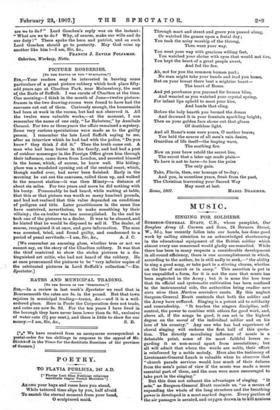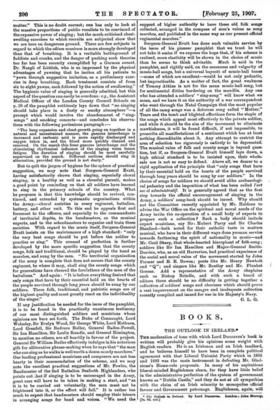M U SI C.
SINGING FOR SOLDIERS.
SIMGEON-GENERAL EVATT, O.B., whose pamphlet, Our Songless Army (J. Curwen and Sons, 24 Berners Street, W., 3d.), has recently fallen into our hands, has done good work by calling attention to an acknowledged shortcoming in the educational equipment of the British soldier which almost every one concerned would gladly see remedied. While there has been in many respects a considerable development in all-round efficiency, there is one accomplishment in which, according to the author, he is still sadly to seek,—" the ability to sing a good song, or take part in a stirring chorus, whether on the line of march or in camp." This assertion is put in too unqualified a form, for it is not the case that music has been neglected in the Army ; but it is none the less tree that its official and systematic cultivation has been confined to the instrumental side, the authorities being readier sere eiere circa than Martens accenclere canto. By this neglect Surgeon-General Evatt contends that both the soldier and the Army have suffered. Singing is a potent aid to solidarity and comradeship. "It teaches the singers discipline, self- control, the power to combine with others for good work, and, above all, if the songs be good, it can act in the highest degree on the moral of the individual soldier and on his love of his country." Any one who has had experience of choral singing will endorse the first half of this quota- tion. The directly moralising influence of music is a debatable point, some of its most faithful lovers re- garding it as non-moral apart from associations; but all will admit that where the words are noble, their effect is reinforced by a noble melody. Here also the testimony of Lieutenant-General Leach is valuable when he observes that "church parade services would lose much of their dulness from the men's point of view if the music was made a more essential part of them, and the men were more encouraged to take part in the singing."
But this does not exhaust the advantages of singing. "It acts," as Surgeon-General Evatt reminds us, "as a means of expanding the whole of the lung structure and the breathing power is developed in a most marked degree. Every portion of the air passages is aerated, and oxygen drawn in to kill noxious
matter." This is no doubt correct; one has only to look at the massive proportions of public vocaliats to be convinced of the expansive power of singing; but the much-criticised chest- swelling exercises to which recruits are subjected show that we are here on dangerous ground. There are few subjects in regard to which the odium musicum is more strongly developed than that of breathing. It is a veritable battleground of faddists and cranks, and the danger of pushing such theories too far has been recently exemplified by a German savant, Dr. Naegli of Lilttioh, who is so impressed by the physical advantages of yawning that be incites all his patients to "yawn through suggestive imitation, as a preliminary exer- cise in deep breathing. Each treatment consists of from six to eight yawns, each followed by the action of swallowing." The hygienic value of singing is generally admitted, but this aspect of the question can easily be overdone: e.g., the Assistant Medical Officer of the London County Council Schools on p. 28 of the pamphlet ruthlessly lays down that "no singing should take place in a dusty or smoky atmosphere "—a precept which would involve the abandonment of "sing- songs " and smoking concerts—and concludes his observa- tions with the following portentous paragraph :— " The lung expansion and chest growth going on together in a natural and unrestrained manner, the gaseous interchange is increased and carbonic acid is more rapidly discharged and oxygen taken in, and the blood more quickly cleaned and renewed. On the march this freer gaseous interchange and the stimulating rhythmical influence of the singing voice lessen fatigue. The duration of singing should be most carefully supervised on the march. Different sections should sing in alternation, provided the ground is not dusty."
But to quit the jargon of hygiene for the sphere of practical suggestion, we may note that Surgeon-General Brett, having satisfactorily shown that singing, especially choral singing, is a healthy as well as a cheerful pursuit, makes a good point by reminding us that all soldiers have learned to sing in the primary schools of the country. What he proposes is that this knowledge should be revived, con- tinued, and extended by systematic organisations within the Army,—choral societies in every regiment, battalion, battery, and other unit. To this end be appeals first and foremost to the officers, and especially to the commandants of territorial depots, to the bandmasters, as the musical experts, and to the schoolmasters to organise and train these societies. With regard to the music itself, Surgeon-General Evatt insists on the maintenance of a high standard: "only the very best songs should be put before the soldier to practise or sing." This counsel of perfection is further developed by the more specific suggestion that the county songs, folk and traditional, should be played by the band as marches, and sung by the men. "No territorial organisation of the army is complete that does not secure that the county regiment, be where it may, shall sing the county songs which for generations have cheered the forefathers of the men of the battalions." And again : " It is before everything desired that only songs that have by their essential hold on the hearts of the people survived through long years should be sung by our soldiers. These folk, traditional, and patriotic songs are of the highest quality and must greatly react on the individuality of the singer."
If any justification be needed for the issue of the pamphlet, it is to be found in the practically unanimous testimony of our most distinguished soldiers and musicians whose opinions are here set forth. The Duke of Connaught, Lord Wolseley, Sir Evelyn Wood, Sir George White, Lord Methuen, Lord Grenfell, Sir Redvers Buller, General Baden-Powell, Sir Ian Hamilton, Sir Leslie Rundle, and General Rimington, to mention no others, are all heartily in favour of the project. General Sir William Butler effectively indulges in his notorious gift for alliterative phrase-making when he says that " the man who can sing as be walks is well worth a dozen moody marchers." Our leading professional musicians and composers are not less hearty in their commendation of the scheme, and we may note the excellent practical suggestions of Mr. Fowles, the Bandmaster of the 2nd Battalion Seaforth Highlanders, who points out :hat if singing is to be encouraged in the Army, great care will have to be taken in making a start, and "as it is to be carried out voluntarily, the men must not be frightened into it, or the effort will faiL" It is rather too much to expect that bandmasters should employ their leisure in arranging songs for band and voices. "We need the support of higher authority to have these old folk songs oolleoted, arranged in the compass of nien's voices as song marches, and published in the same way as our present official regimental marches."
Surgeon-General Evatt has done such valuable service by the issue of his pioneer pamphlet that we trust he will not take it amiss if we express the hope that, if his scheme is realised, more elasticity will be shown in the choice of music than he seems to think advisable. Much is said in the pamphlet, and rightly said, on the meanness and vulgarity of music-hall songs, but a universal boycott of music-hall tunes —some of which are excellent—would be not only pedantic; but impracticable. As a matter of fact, the great weakness of Tommy Atkins is not for the mean music-hall song, but for sentimental ditties bordering on the maudlin. Any one who has attended a soldiers' " sing-song " will know what we mean, and we have it on the authority of a war correspondent who went through the Natal Campaign that the most popular of all the camp songs was a dolorous song called " Mother." Tears and the tomb and blighted affections form the staple of the songs which appeal most effectively to the private soldier, and while it should be the aim of the movement to eliminate mawkishness, it will be found difficult, if not impossible, to proscribe all manifestations of a sentiment which has at least nothing discreditable about it. Any attempt to restrict the area of selection too rigorously is entirely to be deprecated. The musical value of folk and county songs is beyond ques- tion, but if, as Surgeon-General Evatt himself lays down, a high ethical standard is to be insisted upon, their whole- sale use is not so easy to defend. Above all, we demur to a rigid application of the principle that "only songs that have by their essential hold on the hearts of the people survived through long years should be sung by our soldiers." In the choice of songs for soldiers we should avoid alike archaeologi, cal pedantry and the imposition of what has been called Fart sec et administratif. It is generally agreed that as the first step towards the official encouragement of singing in the Army, a soldiers' song-book should be issued. Why should not the Committee recently appointed by Mr. Haldane to advise the War Office on the spiritual and moral needs of the Army invite the co-operation of a small body of experts to prepare snob a collection P Such a body should include expert musicians, say Sirs Hubert Parry and Sir Charles Stanford—both noted for their catholic taste in matters musical, who have in their different ways done yeoman service towards furthering the spirit of nationality in music—and Mr. Cecil Sharp, that whole-hearted hierophant of folk-song; soldiers like Sir Ian Hamilton and Major-General Smith- Dorrien, who, as an old Harrovian, had practical experience of the social and moral value of the movement started by John Farmer and E. E. Bowen; poets like Mr. Henry Newbolt and "Q"; and singers like Mr. Santley and Mr. Plunket Greene. Add a representative of the Army chaplains such as Bishop Brindle, and with such a board of editors there should be no difficulty in getting together a collection of soldiers' songs and choruses which should prove a vast improvement on the meagre and inadequate oolleotion recently compiled and issued-for use in his Majesty's Navy.
C. L. G.











































 Previous page
Previous page